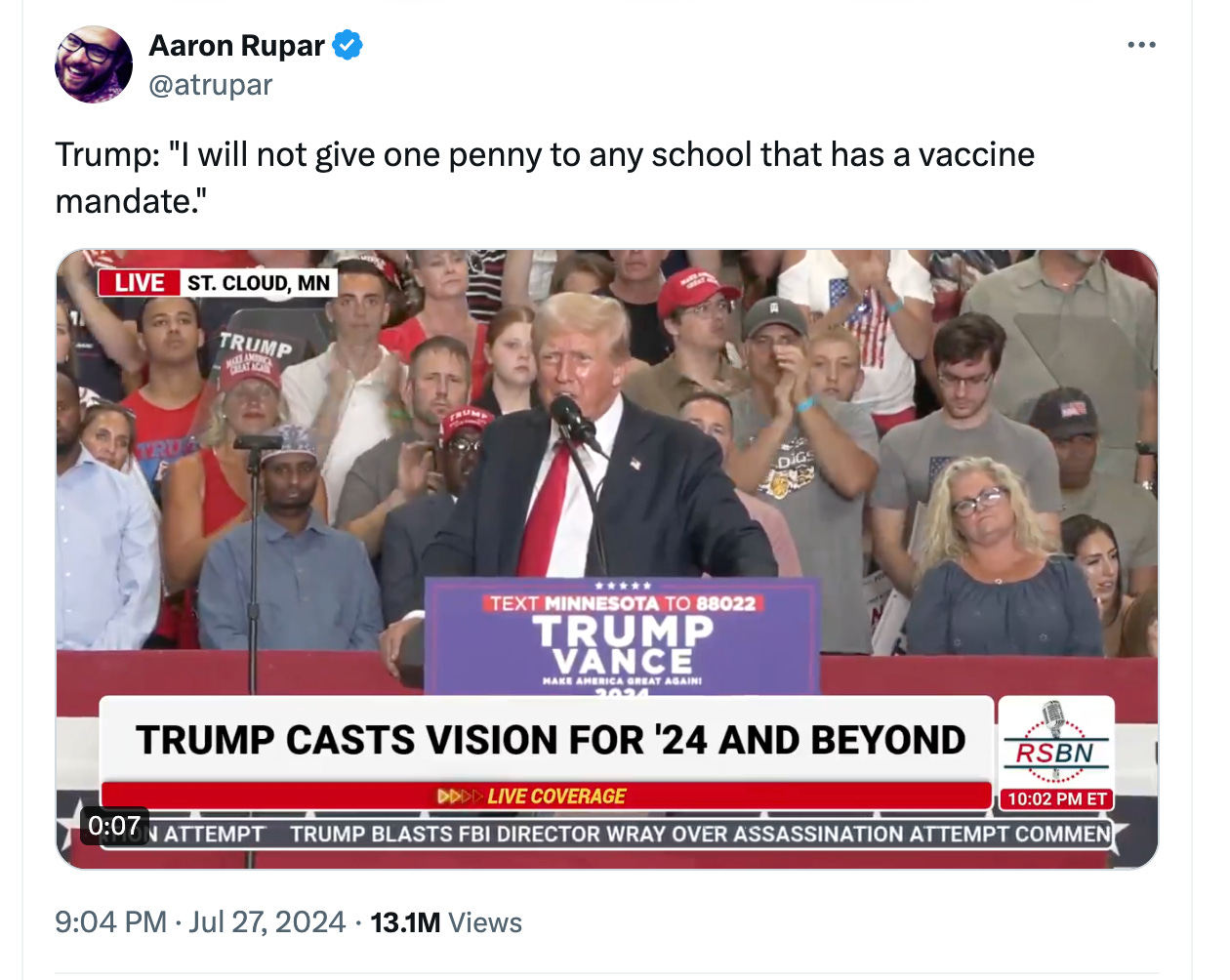Kamala Harris's joyful realism
It's a refreshing change from American Carnage.
This free edition of Public Notice is made possible by paid subscribers. If you aren’t one already, please sign up to support our independent journalism.
The prevailing “take” on the Kamala Harris campaign is that it is “joyous about the joy,” a description that is at once obviously correct and incomplete.
It is only really possible to appreciate being joyful after one has suffered and acknowledged pain and loss. While Vice President Harris’s campaign certainly exudes joy, it is a happiness that arises from a forthright recognition of grave losses the nation suffered during and as a result of Donald Trump’s presidency, together with an abiding optimism that we are on a path toward recovery.
Only a few weeks into the rebooted presidential race, the contrast between the Harris and Trump campaigns is stark. Trump’s campaign is increasingly portrayed as dark, even dystopian, in contrast to the sunniness of Harris and Walz.

Yet the description of Trump as dour is as incomplete as the account of Harris as a ray of sunshine. It misses the abiding attraction many Americans have to Trump’s reactionary vision, a vision grounded on resolute denial of essential facts regarding traumatic events the nation has suffered largely as a result of actions by Trump and his allies.
The surprising outpouring of joy that permeates the nascent Harris campaign reflects a belated recognition of the progress America has made over the past several years in overcoming the grave losses and damage to the nation’s social fabric we suffered during Trump’s presidency. It also reflects a sober but nonetheless optimistic recognition that, with sufficient effort, we can avoid going backwards.
Trump’s disorienting rhetoric of inversion
At the outset of this presidency, Trump portrayed a fictional America consumed by chaos, disorder and “carnage,” and in dire need of a savior — him.
What followed, however, was actual chaos and carnage. Trump’s chaotic and disordered governance culminated in his administration’s nihilistic mismanagement of an historic health crisis that resulted in several million wholly avoidable deaths, while Trump’s assiduous efforts to inflame political and cultural divisions culminated in a literal attack on democracy itself after he lost the 2020 election.
A note from Aaron: Working with great contributors like David requires resources. If you aren’t already a paid subscriber, please support PN by becoming one.
Trump would have had little chance of convincing even his most fanatical fans, let alone other Americans, to return him to the White House had he acknowledged the disastrous nature of his prior term as president. Accordingly, Trump and his GOP followers have devoted the better part of the last four years to creating an elaborate and nearly entirely fictional account of his four years in office.
Trump has demanded his followers forget that he turned a public health emergency that should have brought the nation together into a vehicle for politicizing medical science and increasing social divisions, resulting in more avoidable deaths among Trump’s own Republican followers than in other communities. In recent months, Trump's campaign even begun inviting voters to remember how much “better” things were under his watch four years ago at the chillingly chaotic height of the pandemic.
According to Trump’s alternative history, the president who culpably mismanaged the pandemic was not him, but Biden, who purportedly used the excuse of a nonexistent health emergency to transform the nation into a virtual police state.
Meanwhile, Trump acolytes like JD Vance assert in defiance of all evidence that the only bad things that happened during the pandemic were efforts to mitigate it, including by requiring masking in public places and encouraging people to receive life-saving vaccines. Indeed, Vance has repeatedly argued with a straight face that the fact some school administrators followed the recommendations of public health experts by requiring masking in public schools amounted to proof that they were “anti-child,” if not outright sadistic.
This rewritten history of the pandemic, in which medical science (along with Democrats) are portrayed as being the primary danger, is key to Trump’s vision of his restoration to power. He’s even made a campaign promise to free children from life-saving vaccines for deadly diseases like polio.

The reality denial goes beyond covid. Trump and his followers now assiduously deny that he openly praised neo-Nazis as “very fine people,” though he did so on national television. They’ve also tried to reframe the January 6 coup attempt as something akin to a love-fest (Trump has even gotten into the habit of lying that nobody died that day).
Denying the outcome of the 2020 election has become a virtual litmus test for any Trump follower, and Trump now routinely describes the convicted criminals who invaded the Capitol in support of his coup attempt — including those who assaulted law enforcement officers — as heroes and “hostages” he plans to pardon as soon as he retakes power.
The unacknowledged cost of reality denial
While most Americans have successfully resisted the clarion call of Trump cultism, the nation has yet to grapple with the full scope of the societal cost imposed by such widespread reality denial.
Because of the distractions caused by the portion of the populace that is consumed with denying the reality of the tragedies of the Trump era, the nation has never actually had a chance to mourn, and therefore to recover. Similarly, the nation has not had the chance to celebrate the survival of its democratic institutions in the face of Trump’s coup attempt, in no small part because the insurrectionist threat has never receded.
But perhaps the greatest cost imposed on the United States by the aftershock of the Trump presidency has been an inability to recognize the progress the nation has made over the past several years.
Despite the political, economic, and health crises Trump left in his wake when he fled Washington in January 2021, the country has not only experienced an extraordinary economic recovery, but also a flowering of remarkably successful progressive public policies, the likes of which have not been seen since the 1960s.
And yet, until just weeks ago, to the chagrin of President Biden and the frustration of his allies, most of the nation seemed unimpressed, if not entirely oblivious, to the progress which Trump and his followers so assiduously denied. In fact, the Democratic Party had become so consumed with gloom and pessimism that it seemed poised to hand the election to Trump, despite the fact that he remained one of the most reviled figures in American history.
It was as if the effort of fighting against Trump’s reality denial had consumed so much energy that a surrender to it was becoming inevitable.
Harris’s joyful realism
Against this dire background, the eruption of optimism that immediately met Harris when she surprised the nation by becoming the Democratic Party’s standard-bearer might seem all the more improbable. Where, one might ask, did the opponents of Trumpism, who seemed utterly enervated just days ago, go to get their dose of energy, or shall we call it, joy?
The explanation is not that Harris and her campaign are simply “joyous about the joy;” rather, the Harris campaign reflects a long delayed celebration of the nation’s survival, and indeed its prosperity, in the face of the unprecedented assaults it faced during the Trump era.
But it’s a celebration tempered by a recognition of the challenges ahead. Harris’s most galvanizing issues, after all, are bound up with her supporters’ recognition that the nation’s most treasured attributes are far more vulnerable, and their survival far less certain, than most of us thought just eight years ago.
In this regard, the emergent theme of the Harris campaign — the preservation of what the candidate calls “freedom” — is far less abstract than the theme of the last self-consciously joyful presidential campaign, the “hope and change” call of Barack Obama.
During the 2008 campaign, Obama was criticized, sometimes justifiably, for failing to link his message of optimism to concrete policy objectives. But Harris leaves her supporters with little doubt as to what she means by “freedom,” a term that voters immediately recognize as a call to preserve reproductive rights against right-wing assault, as well to preserve democratic institutions in the face of ongoing GOP threats.
Far from being an abstract championing of salutary principles, Harris’s theme of “freedom” has very immediate and concrete meaning for her audience, just as did Roosevelt’s championing of the “Four Freedoms” in 1941, as fascism was rising in Europe. Further, Harris’s campaign is giving Democrats, and — as the campaign proceeds, hopefully a broad swath of Americans — license to celebrate the impressive recovery and progress the nation has made during the Biden years, despite the many headwinds it continues to face, as well as a long-missing means of galvanizing support for proceeding forward to fight for the implementation of policies that Republicans continue to obstruct.
The joy of Kamala Harris’s campaign, therefore, is also tempered with realism. And that may well make it that much more exuberant.
That’s it for today
We’ll be back with more tomorrow. If you appreciate this post, please support Public Notice by signing up. Paid subscribers make this newsletter possible.
Thanks for reading.






I read plenty of excellent, inspiring, connect-the-dots commentary but this is the most important piece I've read in weeks. Some people I know and respect are already erasing the immense achievements of the Biden administration, on a theory that seems to go something like "over the hill now, over the hill from the beginning." Recovery from the Trump administration -- and from the decades of Reaganomics that preceded it -- has to incorporate an awareness of just how bad things got before the Biden administration started turning it around. Denial, as the old saying goes, is not just a river in Egypt.
I am energized. In fact, I notice how upbeat the music is too. I know Beyoncé's Freedom is a theme song, but also I am hearing more Aretha, Chaka Khan, and Stevie Wonder playing music that is uplifting in an almost religious experience. I am going to dedicate this song to the campaign as well, because it reflects what it is doing to bring people together. Black women for Kamala, White Women for Kamala, Black Men for Kamala, White Dudes for Kamala, Comedians for Kamala, Old People for Kamala, Republicans for Kamala, Mormons for Kamala, etc.... https://youtu.be/-W-hH1r7n5k?si=cd9z_hG0xmqzoLYK